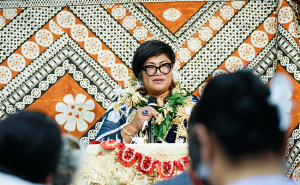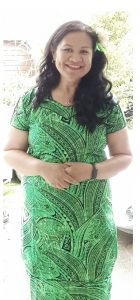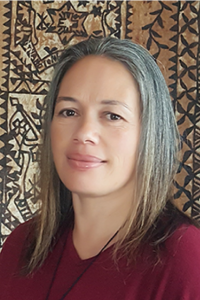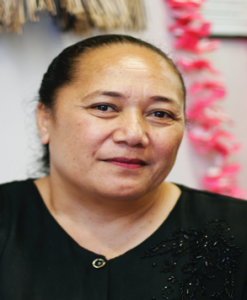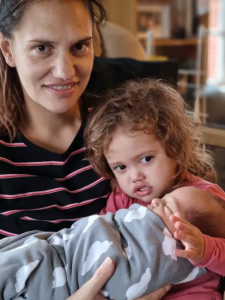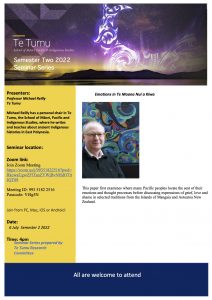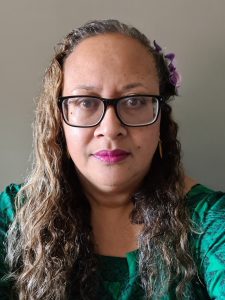Reflections on ‘To Hell With Drowning’ AAPS Conference 2023
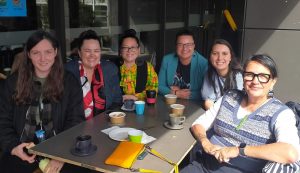
With fellow Māori scholars (L-R): Sam Iti Prendergast, Alice Te Punga Somerville, Marama Salsano, Innez Haua, Karamea, Jo Maarama Kāmira
The following is a reflective piece from Karamea Moana Wright, one of Te Tumu’s PhD candidates in Pacific Islands Studies.
The first Australia Association for Pacific Studies’ conference I participated in was held primarily online in 2021, with separate hubs in Aotearoa and Australia. Because we were in groups on our own campuses, I don’t think I fully understood the magnitude or value of the conference and the association itself until this month, when I attended for the first time in person.
The four days in Canberra at the Australian National University were packed with phenomenal panels, plenaries, roundtables, and whakawhanaungatanga with incredible Pacific thinkers, researchers, artists, leaders, and poets influential in our region and discipline.
This conference opened my eyes in greater measure to salient contemporary conversations taking place in the field, how my own research sits within the broader landscape of Māori, Pacific, and Indigenous Studies, and to see what is possible in my work moving forward. The AAPS conference has left me hopeful, motivated, refreshed, rejuvenated, and encouraged, underscoring the necessity to return for the next AAPS conference in 2023, held in Sydney.
Wonderful achievement for Te Tumu PhD candidate
Te Tumu PhD candidate Wanda Ieremia-Allan is now bound to the UK on a University of Cambridge fellowship to research the historical legacy of the Samoan periodical, O Le Sulu Samoa, a newspaper that has been active for 184 years.Otago’s Bulletin Board wrote a great article on Wanda’s achievement and the background of her interest in this newspaper. Click here to read more.
Te Tumu Seminar: transcending low levels of literacy and numeracy for Pacific people.
Maulupeivao Dr Betty Ofe-Grant is a lecturer from Auckland University of Technology Business School, researching Pacific peoples’ issues in labour migration, careers, glass ceilings, diversity, gender, intersectionality, literacy and numeracy and work. She is also the acting Vice President for the National Council of Women, New Zealand, and a matai (Samoan chief).
Password: 959841
Pacific people in New Zealand are among the most disadvantaged ethnic groups who over-represent the adult working-age population with low literacy and numeracy skills. Individuals with low literacy and numeracy tend to experience higher levels of marginalisation, vulnerability, cycles of poverty and significant risks of poor health and well-being.
Success for Te Tumu Postgrad
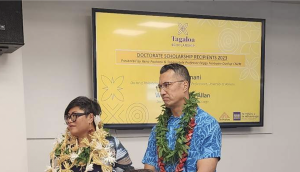 On Wednesday evening, 22nd February, one of our fabulous doctoral candidates, Wanda Ieremia-Allan, was awarded the Tagaloa Scholarship prize. In its second year of running, the Tagaloa Scholarship is awarded to four Pacific masters and doctoral students who are able to “demonstrate that their studies aim improve the social, economic and wellbeing of [the] Pacific, through a Pacific holistic worldview”. Wanda, who recently transferred to Te Tumu from Waikato, is in her final year of doctoral research in Pacific Studies. She is completing cutting-edge research on the impact of Sāmoan missionary newspaper O Le Sulu Samoa and its far-reaching impacts throughout the Pacific. Wanda is being supervised by University of British Columbia Professor Alice Te Punga Somerville, Otago alumni and current Director of USP’s Samoa Campus, To’oto’oleaava Dr. Fanaafi Aiono-Le Tagaloa, and Dr Jess Pasisi here in Te Tumu.
On Wednesday evening, 22nd February, one of our fabulous doctoral candidates, Wanda Ieremia-Allan, was awarded the Tagaloa Scholarship prize. In its second year of running, the Tagaloa Scholarship is awarded to four Pacific masters and doctoral students who are able to “demonstrate that their studies aim improve the social, economic and wellbeing of [the] Pacific, through a Pacific holistic worldview”. Wanda, who recently transferred to Te Tumu from Waikato, is in her final year of doctoral research in Pacific Studies. She is completing cutting-edge research on the impact of Sāmoan missionary newspaper O Le Sulu Samoa and its far-reaching impacts throughout the Pacific. Wanda is being supervised by University of British Columbia Professor Alice Te Punga Somerville, Otago alumni and current Director of USP’s Samoa Campus, To’oto’oleaava Dr. Fanaafi Aiono-Le Tagaloa, and Dr Jess Pasisi here in Te Tumu.
Fast-Start Marsden on Niuean Texts
Fakaalofa lahi atu!
Congratulations to Dr Jess Pasisi on being awarded a FastStart Marsden grant worth $360,000, entitled “Mapping Niue texts in and beyond Aotearoa: Expanding on New Zealand Realm connections to Niue through archival texts.” Jess (Niuean (Mutalau, Hikutavake), Pākehā, Ngāti Pikiao, and Tahitian) is Te Tumu’s most recent academic hire and is based in our Pacific Islands Studies programme, and is already a promising researcher, having been awarded a Pacific Health Postdoctoral Fellowship by the Health Research Council to investigate Niuean happiness.
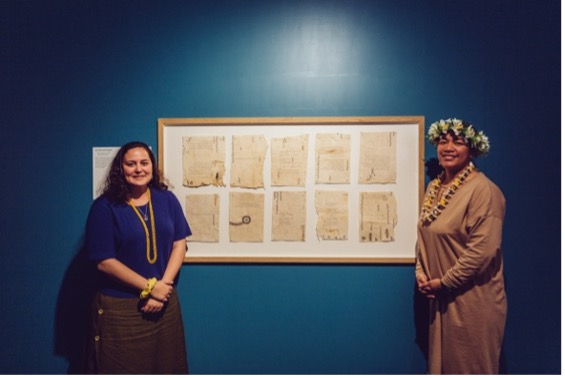
Jess Pasisi (L) and Cora-Allan Lafaiki Twiss at the Auckland Museum exhibition launch of “Archives of Emotion” in 2021, with their piece ‘Ko e Higoa Haaku ko Hiapo’. Photo courtesy of Auckland Museum.
Jess started putting the Mapping Niue texts project together while still based at the University of Waikato, with Professor Alice Te Punga Somerville as Associate Investigator. Professor Somerville has also moved, and is now at the University of British Columbia. She is well versed in literary projects, and Jess worked as a researcher with her in the “Writing the New World” project.
Jess’s Marsden project will be uncovering and analysing Niuean texts – with the meaning of “texts” interpreted quite broadly, comprising publications, manuscripts and other tāoga – with the aim of making these more available to Niuean people in Aotearoa New Zealand, Niue, and beyond. This also involves collaborating with Niuean communities, including cross-disciplinary work with tufuga (experts, practitioners), and encouraging Niuean people to engage with their local archives.
Research outputs include a book based on the project’s research, and the creation of a dataset of Niuean texts which will be invaluable to the wider Niuean community, as well as incoming researchers. Jess is planning three workshops as part of the project, one at Otago, one in Niue, and one at an international venue. Aligning with the aims of Marsden Fund to help develop future scholars, the project will also fund a Masters thesis scholarship, as well as some undergraduate summer scholarships.
We wish Jess well with her exciting new research project, and for a long productive career in academia.
Please also check out the Marsden Fund article for more details on Jess’s research.
Image information. Jess Pasisi wrote the poem for ‘Ko e Higoa Haaku ko Hiapo’ and Cora-Allan Lafaiki Twiss, a tagata Niue artist and practitioner, made it into an art piece that was purchased by the Auckland Museum. To read the poem, see images of the artwork, and more information, click here.
Te Tumu’s UORG success
Three Te Tumu staff, Pai Taani, Dr Telesia Kalavite and Associate Professor Karyn Paringatai, have been awarded University of Otago Research Grants (UORGs) that will allow them to undertake or further research projects.
The title of Paia Taani’s research project is “I ahatia taku reo Māori? Tracking intergenerational transmission of te reo Māori within whānau”. She says, “my own experiences of learning te reo Māori as a second language and raising my own children with the language sparked my interest to investigate what happened to my language. This research project will therefore investigate the intergenerational transmission of te reo Māori within my whānau.”
Paia’s aim is to is to contribute to the existing research and literature about the use of te reo Māori within the context of whānau. Her research includes analysing whānau narratives to examine the historical intergenerational transmission of te reo Māori and will highlight critical moments within these narratives to explore the factors which affected language transmission within her whānau. The key themes emerging from these accounts will inform future language pathways for her whānau, and may also be used to generate recommendations to offer other whānau who may be seeking to reclaim their language.
The University of Otago Research Grant will help fund travel to the North Island to undertake hui and kōrero with participants, and will also fund a research assistant to undertake transcription work.
Paia expects that she will publish at least two journal articles from her research project, and she will one conference presentation. Another expected output of this research project is a hui with her participants where she will disseminate her findings and discuss ways to move forward with future research and support for whānau wanting to reclaim their language.
Telesia Kalavite’s research project explores “The implications of changing cultural practices in Tongan wedding celebrations in New Zealand”, and how these changes impact on Tongan people’s lives in New Zealand. This project has national and international significance in understanding the development of Tongan culture and identity in the diaspora as well as the myriad cultural, social, economic, political and environmental impacts that are encompassed in Tongan wedding celebrations. It will identify and map out traditional cultural practices in Tongan weddings over time and space. This will provide a context in which to explore contemporary factors affecting Tongan wedding practices in Aotearoa.
Telesia sees this as a pilot study for a larger project in the future on how Tongan celebrations impact on Tongan people’s socio-cultural and economic development in Aotearoa New Zealand. She says “I am a Tongan researcher, and it is very important that to get this kind of research righ; there should be people with clear expertise and connection to it, like myself.”
Karyn Paringatai is collaborating with Marcelle Wharerau, formerly a Te Tumu student and staff member who is now an academic based at the Tauranga campus of Te Pua Wānanga ki te Ao – Faculty of Māori and Indigenous Studies, University of Waikato. Their project is titled “Te Aho Tāngaengae: Māmā, Wahine, Māori, Academic”. Socio-economic stability through intergenerational mobility is a priority of whānau Māori; ensuring that future generations have full access to a range of resources that enhances intergenerational whānau wellbeing. Income, education and occupation feature predominantly in intergenerational mobility studies as primary indicators of social and economic status. However, this focus is too narrow and neglects the importance of also embedding cultural stability and responsibility. Whilst socio-economic stability and upward mobility is a priority of Māori, equally important is the intergenerational transmission of te reo Māori and tikanga Māori.
Colonisation has had profound negative effects on all aspects of te ao Māori, including maintaining intergenerational responsibilities for protecting and enhancing the mana of whānau, hapū and iwi. In this unique research, Karyn and Marcelle aim to show how the reestablishment of this intergenerational responsibility to contribute to the decolonisation of te ao Māori must be a deliberate priority and why it is of urgency to do so.
Te Aho Tāngaengae gives voice to the narratives of wāhine Māori academics who are first in family to complete higher education/university and the mechanisms they employ in the intergenerational transmission of cultural capital. Increasing the capacity, and linguistic and cultural capabilities of Māori across generations who can tangibly contribute to improving the social, economic and political wellbeing of te ao Māori must be a priority. This research is important to reveal new insights into the methods used that have the potential to accelerate transformative change within whānau for generations to come.
Te Tumu welcomes new lecturer
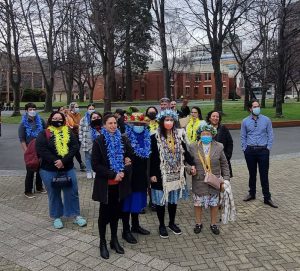
The manuhiri await the karanga. Dr Jess Pasisi stands in the centre of the front row, and Maioha Watson on the far right.
Fakaalofa ahi atu!
On Wednesday 7 September, Te Tumu welcomed our newest staff member, Dr Jess Pasisi, who is of Niuean descent, as well as Pākehā, Ngāti Pikiao and Tahitian roots.
This was also an opportunity to welcome and acknowledge Maioha Watson (Ngāti Maniapoto) who has been doing an excellent job teaching MAOR308 this semester.
The pōwhiri followed tikanga Māori, but also incorporated Pacific elements as well, with Niuean speeches and a performance by our Pacific coordinator Telesia Kalavite alongside Tongan students, as well as Pacific food for the hākari. Special thanks must also go to Maioha, the kaikōrero for the manuhiri, Neihana Matiu who spoke for the tangata whenua, and Kare Tipa who had held waiata classes for staff, and who kept us to tikanga.
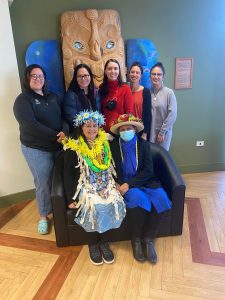
Rear, from left: Waikato staff and postgrads: Marcelle Wharerau, Marama Salsano, Karamea Moana Wright, Hineitimoana Greensill, and Jesi Lujan Bennett. Front: Jess Pasisi and Luisa Posimani.
Jess is currently finishing off a Health Research Council funded postdoctoral studies on Niuean wellbeing and happiness that she started while at the University of Waikato. She also has research interests in climate change in the Pacific, and the Pacific countries that make up the New Zealand realm (Cook Islands, Niue and Tokelau).
Some Waikato postgraduate students and staff came with Jess to hand her over to Te Tumu. Dunedin-based people may well remember Marcelle Wharerau, who worked and studied in Te Tumu, gaining an MA in Indigenous Development. After the pōwhiri, these guests attended a ‘conversation’ organised by Dr Emma Powell, together with a number of Te Tumu staff. Everyone had some time to share their research and discuss some of their experiences within academia.
Te Tumu is very pleased to have Jess joining our Pacific Islands Studies team, and look forward to what she can bring us. Fakaaue lahi!
Te Tumu Seminar: Emotions in Te Moana Nui a Kiwa
Professor Michael Reilly will be presenting a seminar, Emotions in Te Moana Nui a Kiwa, at 4pm, on Wednesday 6 July. Please click on the poster below for more details.
This will be by zoom:
https://zoom.us/j/99351822516?pwd=RkcwaUgwZFlTanZYWjBvNHdOTitJQT09
Meeting ID: 993 5182 2516; Passcode: Yf4g5N
Please feel free to forward to anyone who might be interested.
COVID-19 Talanoa: the South Canterbury Tongan community
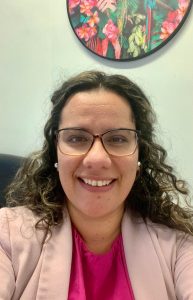 Last week, Pauline-Jean Luyten (Tongan, Dutch) walked across the graduation stage to be “capped” for completing her Master of Indigenous Studies degree.
Last week, Pauline-Jean Luyten (Tongan, Dutch) walked across the graduation stage to be “capped” for completing her Master of Indigenous Studies degree.
Pauline is a Timaru-based lawyer. She conducted her MIndS research on a local topic, but one that touches everyone across the globe: “COVID-19 Talanoa: The Voices of Tongan Kāinga in South Canterbury”. Dr Telesia Kalavite, of our Pacific Islands Studies programme supervised this research.
Abstract: This research is an exploratory study on the experiences of Tongan kāinga (distant relations/community) in the rural region of South Canterbury, New Zealand before and during the COVID-19 pandemic. It examines Tongan kāinga’s migration stories and their experiences in response to COVID-19 from March 2020 to May 2020. Migration stories were gathered to provide background and context for Tongan kāinga’s diverse responses during COVID-19 and to acknowledge participants’ journey to the diaspora. A further aim was to challenge the deficit theory paradigm often ascribed to Pacific ethnic-specific populations by demonstrating the richness and strength of Tongan cultural values, knowledge, and customs. The Kakala methodology comprised individual talanoa with nine participants based in South Canterbury. Findings showed that kāinga Tonga in South Canterbury derived strength from their children, family, and faith to persevere and support each other throughout the COVID-19 pandemic. Hardships were navigated through care and concern for others, gathering and processing information, and collective activation and mobility.
Findings also revealed that participants negotiated between Tongan and Western values in the predominantly New Zealand European ethnic region. They do this as individuals, and as kāinga through the Tongan Society South Canterbury. Local community-based solutions and cross-cultural provider collaboration, irrespective of ethnicity, was strong and effective in South Canterbury with selective organisations. Participants reflected and demonstrated that Tākanga ‘Emau Fohe (together we can make a difference) contributed to overcoming hardships during COVID-19. This is the first piece of academic research on the experiences of Tongan kāinga in South Canterbury, or any comparatively small Tongan or Pacific ethnic-specific community in New Zealand. Further research is warranted.
Future plans: We asked Pauline what her future plans might be. She replied, “I intend to undertake PhD study and conduct further research on Tongan kāinga in the provincial regions in the South Island or isolated areas in Aotearoa New Zealand. Being NZ born with both Tongan and Dutch heritage, I have an interest in exploring the praxis of engagement between cultures, identity and belonging. Most importantly, to identify practical ways for our respective cultures to understand each other, substantiated in community-based solutions and research. I aim to utilise the knowledge and skills derived from my thesis to assist with cultural awareness and education described in a way that is understood by mainstream resident population whilst ensuring maintenance of Tongan values. Contemporaneously, I endeavour to be and support our kāinga to be at the decision-making table to ensure equity of input, equity of access and equity of outcome and challenge the deficit theory paradigm. This way we can carry our ancestors’ values and leave a legacy for our fānau (children)”
Fakamālō atu, Pauline. We wish you all the best with your future studies.
New opportunity for Dr Michelle Schaaf
Being an academic at a university is not just about teaching and research. It’s also about leadership and capacity building. This post looks at new opportunity for Dr Michelle Schaaf of our Pacific Islands Studies programme to develop these skills.
Te Manahua New Zealand Universities Women in Leadership Programme (NZUWiL) is an initiative for the New Zealand tertiary education sector funded by Universities New Zealand – Te Pōkai Tara. This programme aims to recognise and enhance women’s leadership capacities and influence within universities. It provides opportunities for participants to examine leadership approaches and strategies; increase understanding of the tertiary education sector, research management, leadership capability, diverse learning environments that builds on the diversity of experience within the group, personal and national networks, active communication and change management techniques.
Michelle is the current Humanities Associate Dean Pacific and a senior lecturer in Te Tumu. At the end of March, she received confirmation that she was the recipient of the Te Manahua NZUWiL Pasifika Women Scholarship and a successful University of Otago nominee selected to attend the 2022 Te Manahua New Zealand University Women in Leadership: Academic Programme.
While Michelle has held numerous leadership roles, she strongly believes that there is always the space and need to upskill to ensure that one does not become a complacent leader. She grasped the opportunity to apply for Te Manahua NZUWiL Programme and the Pasifika Women Scholarship, as vehicle through which she could learn how to become a more effective leader who responds to challenges in a timely and respectful manner. On completion of this programme, Michelle proposes to reciprocate the University of Otago’s nomination, through the transfer of this new basket of knowledge and skills to capacity build and mentor staff.

